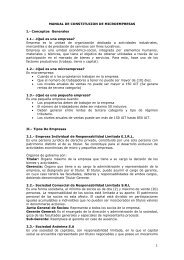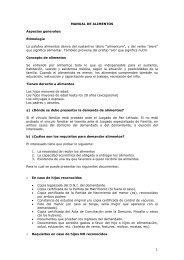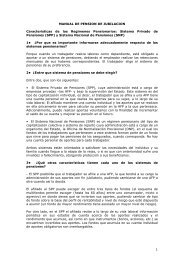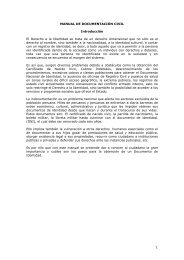ICISS report - International Coalition for the Responsibility to Protect
ICISS report - International Coalition for the Responsibility to Protect
ICISS report - International Coalition for the Responsibility to Protect
You also want an ePaper? Increase the reach of your titles
YUMPU automatically turns print PDFs into web optimized ePapers that Google loves.
1<br />
1. THE POLICY CHALLENGE<br />
THE INTERVENTION DILEMMA<br />
1.1 “Humanitarian intervention” has been controversial both when it happens, and when<br />
it has failed <strong>to</strong> happen. Rwanda in 1994 laid bare <strong>the</strong> full horror of inaction. The United<br />
Nations (UN) Secretariat and some permanent members of <strong>the</strong> Security Council knew<br />
that officials connected <strong>to</strong> <strong>the</strong> <strong>the</strong>n government were planning genocide; UN <strong>for</strong>ces were<br />
present, though not in sufficient number at <strong>the</strong> outset; and credible strategies were available<br />
<strong>to</strong> prevent, or at least greatly mitigate, <strong>the</strong> slaughter which followed. But <strong>the</strong> Security<br />
Council refused <strong>to</strong> take <strong>the</strong> necessary action. That was a failure of international will – of<br />
civic courage – at <strong>the</strong> highest level. Its consequence was not merely a humanitarian<br />
catastrophe <strong>for</strong> Rwanda: <strong>the</strong> genocide destabilized <strong>the</strong> entire Great Lakes region and<br />
continues <strong>to</strong> do so. In <strong>the</strong> aftermath, many African peoples concluded that, <strong>for</strong> all <strong>the</strong><br />
rhe<strong>to</strong>ric about <strong>the</strong> universality of human rights, some human lives end up mattering a great<br />
deal less <strong>to</strong> <strong>the</strong> international community than o<strong>the</strong>rs.<br />
1.2 Kosovo – where intervention did take place in 1999 – concentrated attention on all<br />
<strong>the</strong> o<strong>the</strong>r sides of <strong>the</strong> argument. The operation raised major questions about <strong>the</strong> legitimacy<br />
of military intervention in a sovereign state. Was <strong>the</strong> cause just: were <strong>the</strong> human rights<br />
abuses committed or threatened by <strong>the</strong> Belgrade authorities sufficiently serious <strong>to</strong> warrant<br />
outside involvement? Did those seeking secession manipulate external intervention <strong>to</strong><br />
advance <strong>the</strong>ir political purposes? Were all peaceful means of resolving <strong>the</strong> conflict fully<br />
explored? Did <strong>the</strong> intervention receive appropriate authority? How could <strong>the</strong> bypassing and<br />
marginalization of <strong>the</strong> UN system, by “a coalition of <strong>the</strong> willing” acting without Security<br />
Council approval, possibly be justified? Did <strong>the</strong> way in which <strong>the</strong> intervention was carried<br />
out in fact worsen <strong>the</strong> very human rights situation it was trying <strong>to</strong> rectify? Or – against all<br />
this – was it <strong>the</strong> case that had <strong>the</strong> North Atlantic Treaty Organization (NATO) not<br />
intervened, Kosovo would have been at best <strong>the</strong> site of an ongoing, bloody and destabilizing<br />
civil war, and at worst <strong>the</strong> occasion <strong>for</strong> genocidal slaughter like that which occurred in<br />
Bosnia four years earlier?<br />
1.3 The Bosnian case – in particular <strong>the</strong> failure by <strong>the</strong> United Nations and o<strong>the</strong>rs <strong>to</strong><br />
prevent <strong>the</strong> massacre of thousands of civilians seeking shelter in UN “safe areas” in<br />
Srebrenica in 1995 – is ano<strong>the</strong>r which has had a major impact on <strong>the</strong> contemporary policy<br />
debate about intervention <strong>for</strong> human protection purposes. It raises <strong>the</strong> principle that<br />
intervention amounts <strong>to</strong> a promise <strong>to</strong> people in need: a promise cruelly betrayed. Yet<br />
ano<strong>the</strong>r was <strong>the</strong> failure and ultimate withdrawal of <strong>the</strong> UN peace operations in Somalia in<br />
1992–93, when an international intervention <strong>to</strong> save lives and res<strong>to</strong>re order was destroyed<br />
by flawed planning, poor execution, and an excessive dependence on military <strong>for</strong>ce.<br />
1.4 These four cases occurred at a time when <strong>the</strong>re were heightened expectations <strong>for</strong><br />
effective collective action following <strong>the</strong> end of <strong>the</strong> Cold War. All four of <strong>the</strong>m – Rwanda,<br />
Kosovo, Bosnia and Somalia – have had a profound effect on how <strong>the</strong> problem of<br />
intervention is viewed, analyzed and characterized.<br />
1.5 The basic lines in <strong>the</strong> contemporary policy debate, one constantly being re-engaged at<br />
UN headquarters in New York and in capitals around <strong>the</strong> world, have been clearly enough<br />
drawn. For some, <strong>the</strong> international community is not intervening enough; <strong>for</strong> o<strong>the</strong>rs it is









